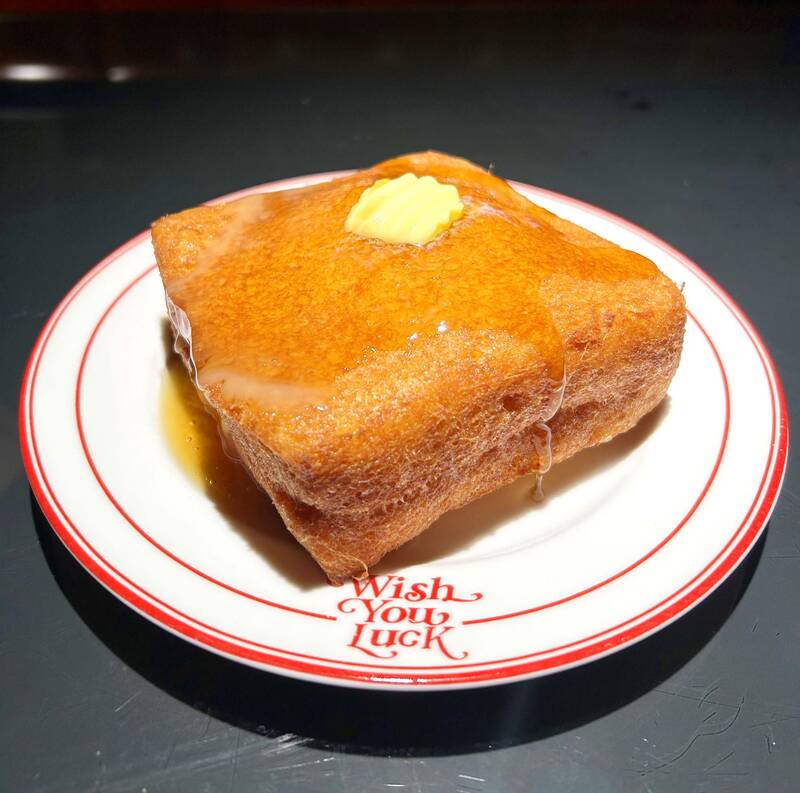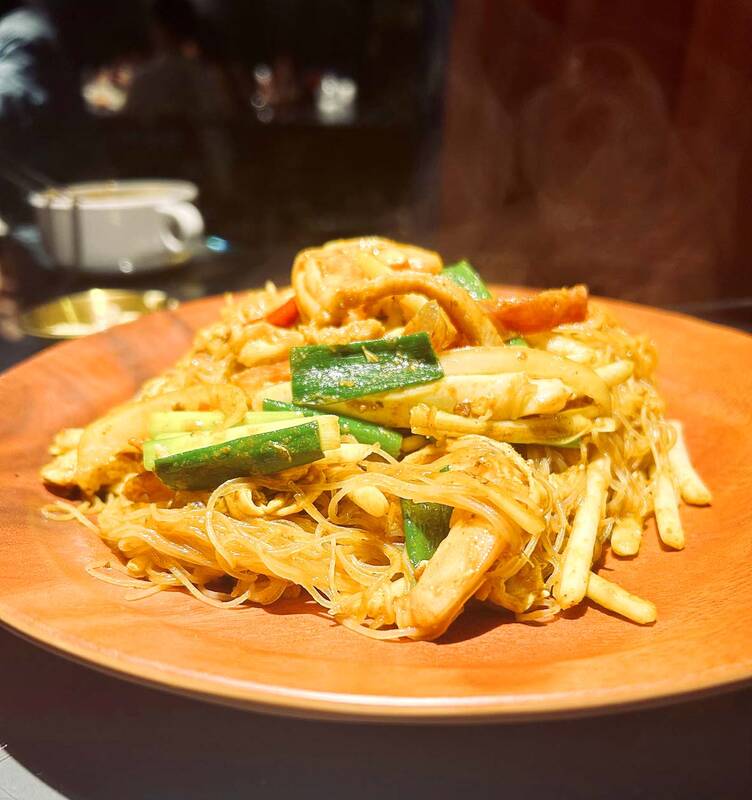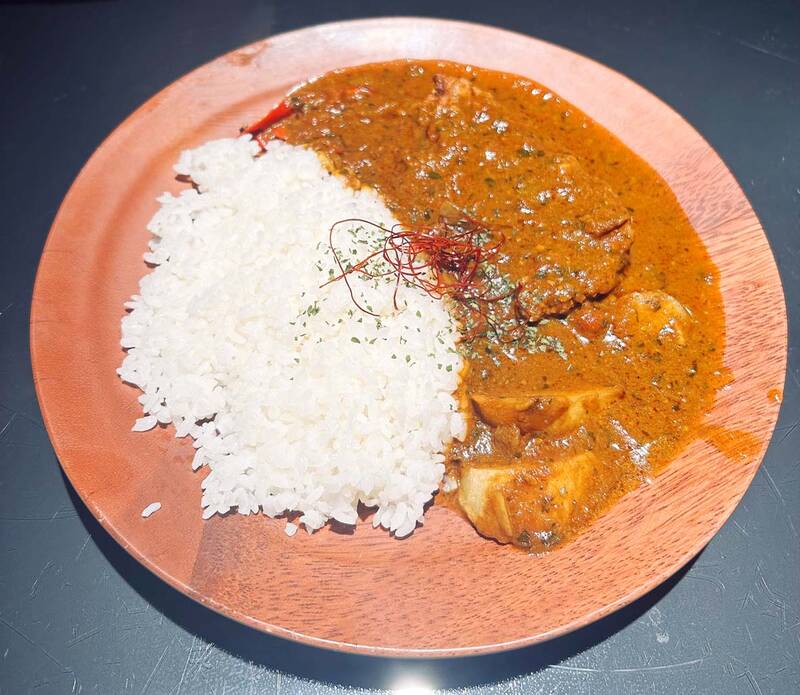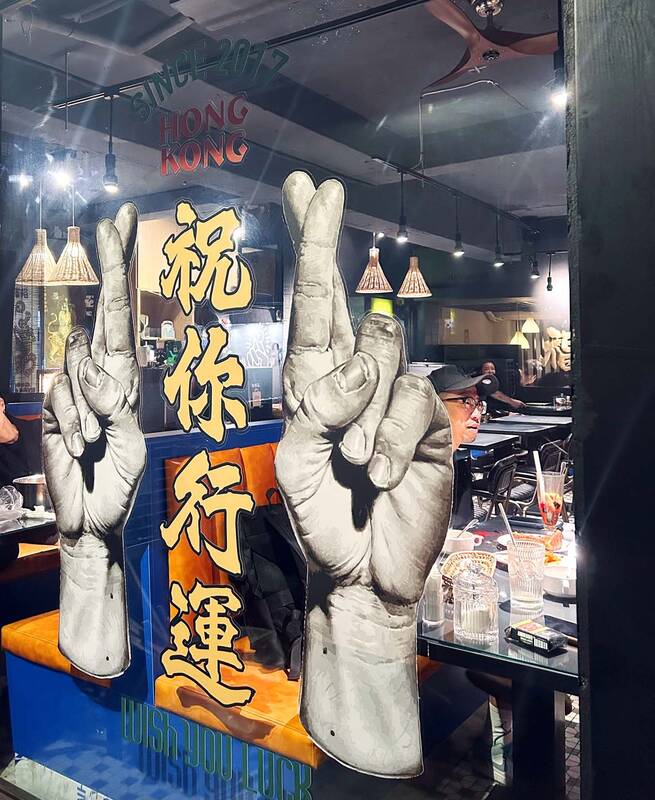“Wish You Luck is not just a culinary experience, it’s a continuation of our cultural tradition,” says James Vuong (王豪豐), owner of the Daan District (大安) Hong Kong diner.
On every corner of Kowloon, diners pack shoulder-to-shoulder over strong brews of Hong-Kong-style milk tea, chowing down on French Toast and Cantonese noodles. Hong Kong’s ubiquitous diner-style teahouses, known as chachaanteng (茶餐廳), have been a cultural staple of the city since the 1950s.
“They play an essential role in the daily lives of Hongkongers,” says Vuong.

Photo: Hollie Younger
Wish You Luck (祝您行運) offers that same vibrant melting pot of culture and cuisine. In the winding alleys of Taipei’s Gongguan area, floor-to-ceiling windows reveal couples sharing meals in cozy booths and local students gather to sip tea in the warm comfort of this charming Hong Kong diner. The decor takes the classic Wong Kar-wai-style 80s diner for a modern twist with black walls, sleek lighting and gold finishes.
We slip into a rather retro, orange leather-upholstered booth with clashing blue tiles and get straight to ordering a classic Hong-Kong-style milk tea (NT$80). A colonial relic of the British occupation, after World War II this luxury status symbol trickled down to the humble Hong Kong street stall, where the brew was strengthened and milk swapped for cans of condensed milk. Nowadays, the local government estimates Hongkongers drink 2.5 million mugs a day.
Vuong says some customers visit daily for their milk tea hit, perhaps bitter by Taiwanese bubble tea standards, but me and my dining companion feel right at home.

Photo: Hollie Younger
This entire review could be about the French toast (NT$180). It’s simply the best dessert I’ve had in Taipei. Prior to this discovery, it was Din Tai Fung’s (鼎泰豐) salted egg custard buns. But Wish You Luck’s French toast takes everything we love about those buns and elevates them to sticky sweet new heights.
A brick-sized slab of fried toast with a melty cube of butter sliding off a glistening crust, Vuong recommends I opt for both syrup and condensed milk. I slather on obligingly. And then I dig in. Rivulets of ocher-yellow salted egg yolk custard ooze onto the plate. Thick, textured, moreish; perhaps Hong Kong has created the world’s best custard, and Wish You Luck serves lashings of it. Their house-made custard transforms what I thought was a humble French Toast into a molten lava cake of over-indulgence, surprisingly not too sweet as I polish off most of the plate, usually a sharing item.
But perhaps I’m getting ahead of myself. The savory options are what brought me back for my French toast foray. Vuong opened Wish You Luck in 2017, and for the past eight years, he has continuously refined and updated his recipes to blend authentic Hong Kong cuisine and his personal experiences and tastes.

Photo: Hollie Younger
The best example of this would be the pork chop curry (NT$280). Vuong says the dish incorporates Pakistani and Indian flavor profiles, a world away from the sweet Japanese curry ubiquitous in Taiwan. This has a strong spice hit, with his house-made spice blend making for a fragrant and decadent gravy that reflects his hometown’s unique fusion of Asian flavors. The menu insists curry lovers “must order” this dish, and I concur.
Chinese food in the UK is mostly Cantonese due to waves of immigration from Guangdong and Hong Kong. Spotting prawn toast (NT$200) on the menu sparked a moment of nostalgia; this British favorite and rare Hong Kong relic in Taiwan features a crispy, golden sesame exterior and buttery shrimp filling. These guys really know their toast.
Next, I go for chef-recommended “shrimp shrimp shrimp fried rice” (NT$280). If any fellow shrimp lovers have ever wondered how much shrimp one could pack into a single dish, Wish You Luck got there first. Shrimp roe, meaty shrimp morsels, crispy tails and a rich house-made shrimp oil, it doesn’t get much shrimpier than this.

Photo: Hollie Younger
A true puritan, Vuong explains that his menu has not been adjusted to local tastes. His manifesto: for Hong Kong implants to “find familiarity in a foreign land and feel a sense of belonging.” And for local Taiwanese customers, “to serve as a window into the authentic flavors of Hong Kong.”
With Hong Kong immigration to Taiwan increasing year-on-year, Wish You Luck slots in at a time when Taiwan is keen to experience and integrate Hong Kong culture, inseparable from its culinary history, built by colonizers and immigrants, local flavors and age-old traditions.
“Food is the most direct cultural language, able to bridge geographical and linguistic barriers and connect people from different backgrounds,” says Vuong, and Wish You Luck speaks right to the soul.

Desperate dads meet in car parks to exchange packets; exhausted parents slip it into their kids’ drinks; families wait months for prescriptions buy it “off label.” But is it worth the risk? “The first time I gave him a gummy, I thought, ‘Oh my God, have I killed him?’ He just passed out in front of the TV. That never happens.” Jen remembers giving her son, David, six, melatonin to help him sleep. She got them from a friend, a pediatrician who gave them to her own child. “It was sort of hilarious. She had half a tub of gummies,

June 23 to June 29 After capturing the walled city of Hsinchu on June 22, 1895, the Japanese hoped to quickly push south and seize control of Taiwan’s entire west coast — but their advance was stalled for more than a month. Not only did local Hakka fighters continue to cause them headaches, resistance forces even attempted to retake the city three times. “We had planned to occupy Anping (Tainan) and Takao (Kaohsiung) as soon as possible, but ever since we took Hsinchu, nearby bandits proclaiming to be ‘righteous people’ (義民) have been destroying train tracks and electrical cables, and gathering in villages

The wide-screen spectacle of Formula One gets a gleaming, rip-roaring workout in Joseph Kosinski’s F1, a fine-tuned machine of a movie that, in its most riveting racing scenes, approaches a kind of high-speed splendor. Kosinski, who last endeavored to put moviegoers in the seat of a fighter jet in Top Gun: Maverick, has moved to the open cockpits of Formula One with much the same affection, if not outright need, for speed. A lot of the same team is back. Jerry Bruckheimer produces. Ehren Kruger, a co-writer on Maverick, takes sole credit here. Hans Zimmer, a co-composer previously, supplies the thumping

Swooping low over the banks of a Nile River tributary, an aid flight run by retired American military officers released a stream of food-stuffed sacks over a town emptied by fighting in South Sudan, a country wracked by conflict. Last week’s air drop was the latest in a controversial development — private contracting firms led by former US intelligence officers and military veterans delivering aid to some of the world’s deadliest conflict zones, in operations organized with governments that are combatants in the conflicts. The moves are roiling the global aid community, which warns of a more militarized, politicized and profit-seeking trend